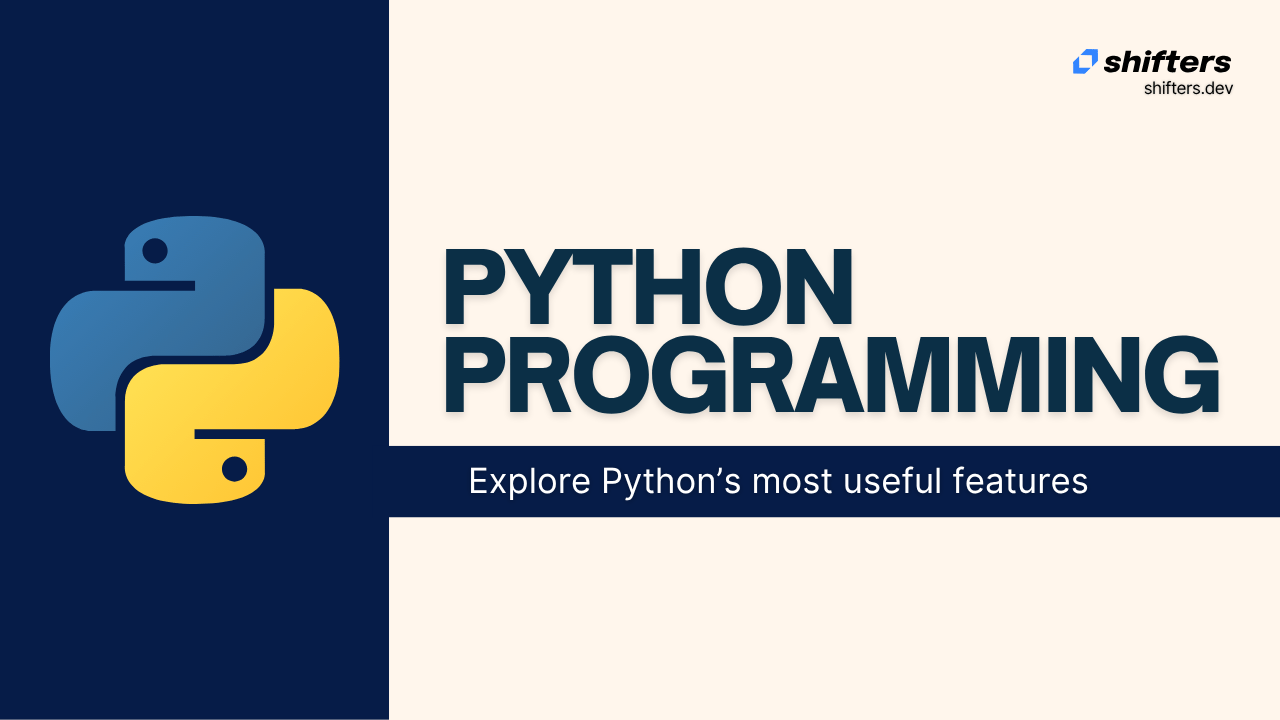Python has become the world's most popular programming language, and there's a good reason for it. Whether you're a complete beginner or an experienced developer, Python offers features that make coding enjoyable and productive. Let me walk you through the advanced features that make Python stand out in 2025.
What makes Python powerful?
Python isn’t just another programming language. It’s a key technology behind some of the world’s most successful companies. While many languages require you to struggle with complex syntax, Python lets you focus on solving real problems with clear, readable code. Netflix uses Python extensively for data analysis and automation, NASA relies on it for scientific computing and space missions, and Google uses Python in many of its services, including parts of YouTube’s infrastructure.
What sets Python apart is its "batteries included" philosophy, meaning it comes with a rich standard library that supports many common programming tasks out of the box. Additionally, Python has a vast ecosystem with over 300,000 third-party packages available through PyPI. Whether you’re building AI systems, web applications, or data analysis tools, Python offers the flexibility, performance, and simplicity to handle enterprise-level projects while remaining accessible for rapid prototyping.
Top 15 Python features you must know
These are the most important Python features that every developer should understand. From basic functionality to advanced capabilities, these features make Python the top choice for programmers worldwide.
1. Free and open source
Python costs absolutely nothing to use. Download it from python.org and start building immediately. Being open source means thousands of developers worldwide contribute to making it better every day.
# Your first Python program - completely free!
print("Hello, Python World!")
cost = 0
print(f"Total cost to start: ${cost}")
Major companies like Instagram and Dropbox built their platforms using this free language.
2. Easy to learn
Python's syntax is so clean it reads like English. Perfect for beginners but powerful enough for experts.
# Simple and readable
age = 25
if age >= 18:
print("You can vote!")
else:
print("Too young to vote")
# Working with lists
fruits = ["apple", "banana", "orange"]
for fruit in fruits:
print(f"I like {fruit}")
3. Easy to code
Writing Python feels natural. No complex syntax rules or unnecessary symbols.
# Simple calculator function
def calculate_tip(bill, tip_percent):
tip = bill * (tip_percent / 100)
total = bill + tip
return total
# Use the function
dinner_bill = 50.00
final_amount = calculate_tip(dinner_bill, 15)
print(f"Total with tip: ${final_amount}")
4. Cross-platform language
Write once, run everywhere. Your Python code works on Windows, Mac, and Linux without changes.
import platform
print(f"Running on: {platform.system()}")
print("This code works on any operating system!")
5. Database support
Python works seamlessly with all major databases. Built-in support for SQLite, MySQL, PostgreSQL, and more.
import sqlite3
# Connect to database
conn = sqlite3.connect('users.db')
cursor = conn.cursor()
# Create table
cursor.execute('''CREATE TABLE IF NOT EXISTS users
(id INTEGER PRIMARY KEY, name TEXT, email TEXT)''')
# Insert data
cursor.execute("INSERT INTO users (name, email) VALUES (?, ?)",
("John Doe", "john@email.com"))
conn.commit()
conn.close()
6. Interpreted language
Python executes code line by line, making debugging easier. No compilation step needed.
# Runs immediately - no compilation required
numbers = [1, 2, 3, 4, 5]
squared = [x**2 for x in numbers]
print(f"Original: {numbers}")
print(f"Squared: {squared}")
7. Object-oriented language
Python supports classes and objects, helping you organize code better and make it reusable.
class BankAccount:
def __init__(self, owner, balance=0):
self.owner = owner
self.balance = balance
def deposit(self, amount):
self.balance += amount
return f"Deposited ${amount}. New balance: ${self.balance}"
def withdraw(self, amount):
if amount <= self.balance:
self.balance -= amount
return f"Withdrew ${amount}. Remaining: ${self.balance}"
return "Insufficient funds"
# Create account
account = BankAccount("Alice", 1000)
print(account.deposit(500))
print(account.withdraw(200))
8. Extensible
Python integrates with other languages like C and C++ for performance-critical tasks. You can also use existing libraries written in other languages.
import time
# Python function
def fibonacci(n):
if n <= 1:
return n
return fibonacci(n-1) + fibonacci(n-2)
# Optimized version with memoization
def fast_fibonacci(n, memo={}):
if n in memo:
return memo[n]
if n <= 1:
return n
memo[n] = fast_fibonacci(n-1, memo) + fast_fibonacci(n-2, memo)
return memo[n]
# Compare performance
result = fast_fibonacci(30)
print(f"Fibonacci(30) = {result}")
9. GUI programming support
Create desktop applications with user-friendly interfaces using built-in libraries like tkinter.
import tkinter as tk
def say_hello():
label.config(text="Hello from Python!")
# Create window
window = tk.Tk()
window.title("My Python App")
window.geometry("300x150")
# Add button
button = tk.Button(window, text="Click Me!", command=say_hello)
button.pack(pady=20)
# Add label
label = tk.Label(window, text="Welcome to Python GUI")
label.pack()
# Run app
window.mainloop()
10. High-level language
Python handles complex operations automatically. Focus on solving problems, not managing memory or system details.
# Python handles everything automatically
import requests
from datetime import datetime
def get_data():
# Python manages HTTP connections, JSON parsing, memory
try:
response = requests.get("https://api.github.com/users/octocat")
data = response.json()
return f"User: {data['name']}, Followers: {data['followers']}"
except:
return "Unable to fetch data"
print(get_data())
11. Large standard library
Python comes with hundreds of built-in modules. From working with dates to sending emails, everything is included.
import datetime
import random
import json
import os
# Date operations
today = datetime.date.today()
print(f"Today: {today}")
# Random operations
lucky_number = random.randint(1, 100)
print(f"Lucky number: {lucky_number}")
# JSON operations
data = {"name": "Python", "year": 1991}
json_string = json.dumps(data)
print(f"JSON: {json_string}")
# File operations
current_dir = os.getcwd()
print(f"Current directory: {current_dir}")
12. Frontend and backend development
Build complete web applications using frameworks like Django and Flask for backend, and libraries for frontend.
from flask import Flask
app = Flask(__name__)
@app.route('/')
def home():
return '''
<h1>Welcome to My Python Web App!</h1>
<p>Built with Python and Flask</p>
<button onclick="alert('Hello from Python!')">Click Me</button>
'''
@app.route('/api/data')
def api():
return {"message": "Hello from Python API", "status": "success"}
if __name__ == '__main__':
app.run(debug=True)
13. Dynamically-typed language
No need to declare variable types. Python figures it out automatically, making coding faster and more flexible.
# Variables can change types dynamically
data = "Hello" # String
print(f"String: {data}")
data = 42 # Integer
print(f"Number: {data}")
data = [1, 2, 3] # List
print(f"List: {data}")
data = {"key": "value"} # Dictionary
print(f"Dictionary: {data}")
14. Huge community support
Python has one of the largest and most helpful programming communities. Get help on Stack Overflow, Reddit, and Python Discord.
# Community best practices example
def process_data(data):
"""
Process data safely using community-established patterns
"""
try:
# Validate input
if not data:
return None
# Process data
result = [item.strip().lower() for item in data if item]
return result
except Exception as e:
print(f"Error processing data: {e}")
return None
# Usage
sample_data = [" Apple ", "BANANA", "", "Cherry "]
processed = process_data(sample_data)
print(f"Processed: {processed}")
15. Dynamic memory allocation
Python automatically manages memory for you. No need to allocate or free memory manually - Python handles it all behind the scenes.
# Python manages memory automatically
def create_data():
# Large data structure - Python handles memory allocation
large_list = list(range(100000))
user_data = {"users": large_list, "count": len(large_list)}
return user_data
# Memory is automatically allocated
data = create_data()
print(f"Created data with {data['count']} items")
# When data goes out of scope, Python automatically frees memory
data = None # Memory is automatically cleaned up
Why Python dominates in 2025
Python's popularity continues to grow because it perfectly balances simplicity with power. Whether you're building websites, analyzing data, creating AI systems, or automating tasks, Python provides the tools and community support you need.
The language evolves constantly with regular updates that improve performance while maintaining the simplicity that made it famous. Major tech companies continue to adopt Python for critical systems, and the job market for Python developers remains strong.
If you're considering learning programming or adding a new language to your skills, Python is the smart choice for 2025 and beyond.



